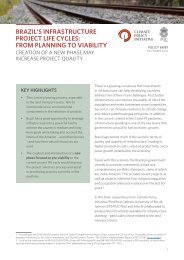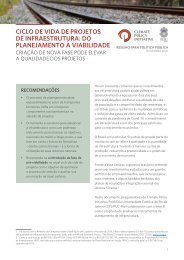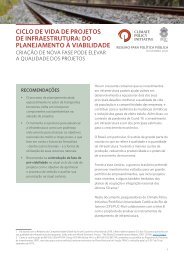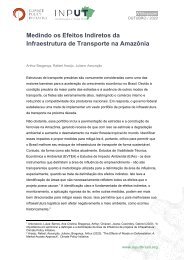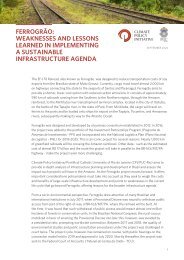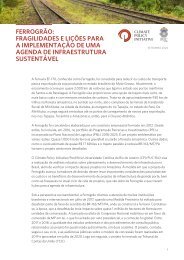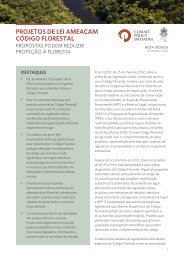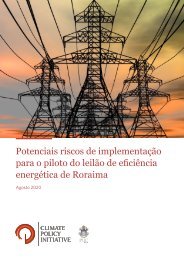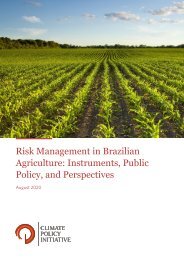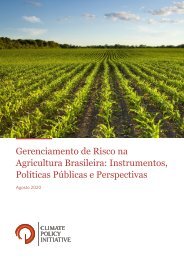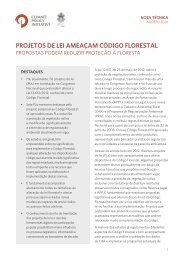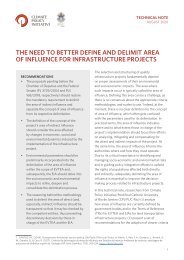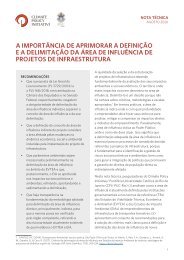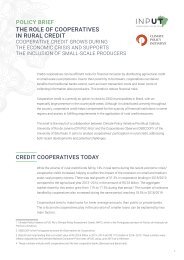Adjustments to the New Concessions Law Bill Could Ensure Higher Quality, and More Sustainable Infrastructure
You also want an ePaper? Increase the reach of your titles
YUMPU automatically turns print PDFs into web optimized ePapers that Google loves.
TECHNICAL NOTE<br />
JUNE 2020<br />
ADJUSTMENTS TO THE NEW CONCESSIONS LAW<br />
BILL COULD ENSURE HIGHER QUALITY, AND MORE<br />
SUSTAINABLE INFRASTRUCTURE<br />
INTRODUCTION<br />
Improving <strong>the</strong> regula<strong>to</strong>ry process in <strong>the</strong> infrastructure sec<strong>to</strong>r is a critical step <strong>to</strong>ward increasing<br />
private investment in <strong>the</strong> sec<strong>to</strong>r <strong>and</strong> boosting <strong>the</strong> quality of projects <strong>and</strong> <strong>the</strong> services <strong>the</strong>y offer.<br />
The new <strong>Concessions</strong> <strong>Law</strong> bill 1 is on <strong>the</strong> Ministry of <strong>the</strong> Economy’s priority agenda. 2 A request<br />
for its expedited approval was sent <strong>to</strong> <strong>the</strong> Senate even before <strong>the</strong> Chamber of Deputies had<br />
finished voting on it.<br />
The new <strong>Concessions</strong> <strong>Law</strong> bill recognizes that infrastructure projects have an impact on social<br />
<strong>and</strong> environmental issues <strong>and</strong> does <strong>to</strong>uch on <strong>the</strong>se issues. However, it does not dialogue with<br />
o<strong>the</strong>r current bills that aim <strong>to</strong> modify existing environmental legislation. 3<br />
In this technical note, researchers at Climate Policy Initiative / Pontifical Catholic University of<br />
Rio de Janeiro (CPI/ PUC-Rio), analyze <strong>the</strong> legislative process of <strong>the</strong> new <strong>Concessions</strong> <strong>Law</strong> bill<br />
from a social <strong>and</strong> environmental perspective. They recommend items that could be incorporated<br />
in<strong>to</strong> <strong>the</strong> bill <strong>to</strong> head off potential conflicts currently h<strong>and</strong>led later in <strong>the</strong> project life cycle —<br />
notably during <strong>the</strong> environmental licensing procedure — <strong>and</strong> which would foster bidding on<br />
more robust, higher quality projects, promoting safer investments, <strong>and</strong> ensuring social <strong>and</strong><br />
environmental protections.<br />
This is an especially good opportunity <strong>to</strong> define at what point a Preliminary Environmental<br />
License must be obtained, who must obtain it – <strong>the</strong> government or <strong>the</strong> concessionaire, <strong>and</strong><br />
<strong>to</strong> require that <strong>the</strong> Technical, Economic <strong>and</strong> Environmental Feasibility Studies (EVTEA) be<br />
conducted before <strong>the</strong> bidding process for greenfield projects begins. These issues are key <strong>to</strong> risk<br />
allocation <strong>and</strong> would particularly help streng<strong>the</strong>n <strong>the</strong> pre-bidding phase.<br />
1 PL 7,063/2017. Available at: https://www2.camara.leg.br/atividade-legislativa/comissoes/comissoes-temporarias/especiais/56a-legislatura/pl-<br />
3453-08-parcerias-publico-privadas/documen<strong>to</strong>s/outros-documen<strong>to</strong>s/SubstitutivoAdotado.pdf. Accessed April 30, 2020.<br />
2 Circular letter Nº 84/2020/ME, received in <strong>the</strong> Senate March 11, 2020 <strong>and</strong> appended <strong>to</strong> Senate bill 3,261/2019.<br />
3 CHIAVARI, Joana; BARROS, Ana Cristina; ANTONACCIO, Luiza; COZENDEY, Gabriel. Technical Note. The Future of <strong>Infrastructure</strong> in Brazil: An<br />
Integrated Vision of Proposed Legislation is Needed <strong>to</strong> <strong>Ensure</strong> Progress. Rio de Janeiro: Climate Policy Initiative, 2019.<br />
1
THE LEGISLATIVE PROCESS OF THE NEW<br />
CONCESSIONS LAW BILL<br />
The new <strong>Concessions</strong> <strong>Law</strong> bill is not <strong>the</strong> result of a single proposed amendment. It emerged<br />
through discussion in <strong>the</strong> Temporary Special Committee, which was created in April 2019 for <strong>the</strong><br />
purpose of studying <strong>the</strong> bill. It was not based only on <strong>the</strong> various bills related <strong>to</strong> concessions <strong>and</strong><br />
bidding, but largely on public hearings held between August <strong>and</strong> November of 2019. 4 Since <strong>the</strong><br />
beginning it has been related <strong>to</strong> o<strong>the</strong>r bills <strong>and</strong> <strong>to</strong>pics in <strong>the</strong> legislature.<br />
Initially, <strong>the</strong> Special Committee was charged with delivering an opinion on bill PL 3,453/2008,<br />
which amends <strong>the</strong> provisions of <strong>the</strong> General Bidding <strong>Law</strong>. 5 Later, due <strong>to</strong> <strong>the</strong> overlapping<br />
subject matter, <strong>the</strong> committee also considered PL 7,063/2017, which proposes amendments<br />
<strong>to</strong> <strong>the</strong> current <strong>Concessions</strong> <strong>Law</strong>. Over <strong>the</strong> course of <strong>the</strong> discussion, <strong>the</strong> chairman realized<br />
that PL 3,453/2008 should be considered separately, <strong>and</strong> that <strong>the</strong> committee should focus<br />
exclusively on PL 7,063/2008 <strong>and</strong> its annexes. This is how <strong>the</strong> Special Committee, originally<br />
formed <strong>to</strong> consider proposed modifications <strong>to</strong> <strong>the</strong> Bidding <strong>Law</strong>, changed its focus <strong>to</strong> <strong>the</strong><br />
<strong>Concessions</strong> <strong>Law</strong>.<br />
It is interesting <strong>to</strong> note that initially none of <strong>the</strong>se bills made any mention of environmental<br />
issues. The bills <strong>and</strong> <strong>the</strong>ir respective annexes made specific proposals for amendments <strong>to</strong> <strong>the</strong><br />
laws on bidding <strong>and</strong> concessions. The Special Committee widened <strong>the</strong> debate by proposing<br />
amendments <strong>to</strong> <strong>the</strong> entire legislation ra<strong>the</strong>r than <strong>to</strong> individual provisions.<br />
In this broader debate, environmental issues were brought up at public hearings <strong>and</strong> by individual<br />
deputies, <strong>and</strong> were partially incorporated in<strong>to</strong> <strong>the</strong> clean bill approved by <strong>the</strong> Committee.<br />
ENVIRONMENTAL ISSUES DISCUSSED IN THE DEBATE<br />
ON THE NEW CONCESSIONS LAW BILL<br />
Since major infrastructure projects are often operated under concession agreements, <strong>and</strong> since<br />
<strong>the</strong>se projects generate social <strong>and</strong> environmental impacts that present serious challenges <strong>to</strong> <strong>the</strong><br />
implementation of <strong>the</strong> concession contracts, <strong>the</strong> new <strong>Concessions</strong> <strong>Law</strong> bill might be expected <strong>to</strong><br />
address <strong>the</strong>se impacts.<br />
The Special Committee’s public hearings <strong>the</strong>refore included a discussion on environmental<br />
provisions, with input from a number of specialists. The main <strong>to</strong>pics discussed included a)<br />
environmental licensing procedures; b) conducting Technical, Economic <strong>and</strong> Environmental<br />
Feasibility Studies (EVTEA); <strong>and</strong> c) defining inves<strong>to</strong>rs’ environmental liability; as detailed below.<br />
4 Public hearings available at https://www2.camara.leg.br/atividade-legislativa/comissoes/comissoes-temporarias/especiais/56a-legislatura/pl-<br />
3453-08-parcerias-publico-privadas. Accessed April 30, 2020.<br />
5 <strong>Law</strong> 8,666/1993.<br />
2
ENVIRONMENTAL LICENSING<br />
The draft put forth by <strong>the</strong> chairman <strong>and</strong> approved by <strong>the</strong> committee in November of 2019<br />
maintains <strong>the</strong> ambiguity as <strong>to</strong> who must obtain <strong>the</strong> Preliminary Environmental License —<br />
<strong>the</strong> government or <strong>the</strong> concessionaire, giving <strong>the</strong> government <strong>the</strong> prerogative <strong>to</strong> decide this<br />
obligation on a case by case basis. At <strong>the</strong> same time, <strong>the</strong> draft provides for <strong>the</strong> possibility of<br />
establishing a period prior <strong>to</strong> a contract’s effective date <strong>to</strong> obtain licensing <strong>and</strong> resolve o<strong>the</strong>r<br />
pending items. The proposal allows <strong>the</strong> public notice <strong>to</strong> define how long a contract can wait<br />
before obtaining <strong>the</strong> preliminary environmental license.<br />
The decision as <strong>to</strong> who is responsible for obtaining a preliminary license is tied <strong>to</strong> which<br />
party assumes <strong>the</strong> risk for <strong>the</strong> environmental feasibility of a project. Also tied <strong>to</strong> this decision<br />
is <strong>the</strong> question of when <strong>the</strong> preliminary environmental license must be obtained, which in<br />
turn determines whe<strong>the</strong>r <strong>the</strong> project structure is complete <strong>and</strong> ready <strong>to</strong> be presented in <strong>the</strong><br />
marketplace. If <strong>the</strong> government is <strong>the</strong> one responsible, <strong>the</strong> license should be obtained before <strong>the</strong><br />
bidding process begins, <strong>and</strong> <strong>the</strong> government should guarantee <strong>the</strong> future concessionaire that<br />
<strong>the</strong> project is environmentally feasible <strong>and</strong> ready for bidding, complete with technical definitions<br />
<strong>and</strong> costs associated with licensing <strong>and</strong> its constraints. If <strong>the</strong> concessionaire is responsible, <strong>the</strong><br />
public notice could require that <strong>the</strong> preliminary environmental license be obtained ei<strong>the</strong>r before<br />
<strong>the</strong> bidding process begins, as a prerequisite for bidding (as is common in <strong>the</strong> electrical sec<strong>to</strong>r, for<br />
example), or after <strong>the</strong> bidding process.<br />
If <strong>the</strong> responsibility falls <strong>to</strong> <strong>the</strong> concessionaire, on <strong>the</strong> one h<strong>and</strong> that party assumes <strong>the</strong> risk<br />
that an authorized environmental agency could refuse its preliminary environmental license —<br />
<strong>the</strong>reby disqualifying it from <strong>the</strong> bidding process — or that <strong>the</strong> agency could take longer <strong>to</strong> decide<br />
than <strong>the</strong> period stipulated in <strong>the</strong> contract, <strong>the</strong>reby delaying its compliance. On <strong>the</strong> o<strong>the</strong>r h<strong>and</strong>,<br />
<strong>the</strong> concessionaire would <strong>the</strong>n be in charge of conducting <strong>the</strong> Environmental Impact Assessment<br />
(EIA), a document that explains how <strong>the</strong> project will be made feasible. This would give <strong>the</strong><br />
concessionaire greater decision-making power over a series of questions essential <strong>to</strong> <strong>the</strong> project,<br />
including what kind of technology will be used, location, <strong>and</strong> what measures will be in place <strong>to</strong><br />
mitigate <strong>and</strong> compensate negative social <strong>and</strong> environmental impacts.<br />
The draft approved by <strong>the</strong> committee does not change <strong>the</strong> current practice, in which <strong>the</strong><br />
preliminary environmental license is defined case by case. Considering that predictability is<br />
crucial for <strong>the</strong> stability of <strong>the</strong> business environment <strong>and</strong> reduces risks, it would be beneficial<br />
if <strong>the</strong>re were a general rule establishing when <strong>the</strong> LP should be obtained by each sec<strong>to</strong>r or for<br />
specific types of projects. This already happens in <strong>the</strong> bidding for hydropower plants, where <strong>the</strong><br />
LP should be obtained before <strong>the</strong> bidding as per foreseen in specific regulation.<br />
<strong>More</strong>over, transparency is needed regarding how exceptions are decided when projects do not<br />
follow <strong>the</strong> general rule, for example, by making <strong>the</strong> project’s risk matrix that was used <strong>to</strong> make<br />
<strong>the</strong> decision available. This <strong>the</strong> direction that Resolution No.1 from <strong>the</strong> Investment Partnership<br />
Program Counsel (CPPI) is taking for <strong>the</strong> projects qualified by <strong>the</strong> Program. 6<br />
6 Resolution Nº 01/2016, CPPI: Article 6 th . When <strong>the</strong> purpose of <strong>the</strong> agreement requires, <strong>the</strong> bidding of <strong>the</strong> projects shall be conditioned,<br />
in accordance with applicable law, <strong>to</strong> <strong>the</strong> certification of its environmental viability by issuing <strong>the</strong> Preliminary License - PL or guidelines for<br />
environmental licensing. Article 7 th . In <strong>the</strong> preparation of <strong>the</strong> public call <strong>and</strong> contract draft, <strong>the</strong> adoption of risk distribution matrix for <strong>the</strong> project must<br />
be made <strong>and</strong> should, at <strong>the</strong> least, take in<strong>to</strong> consideration <strong>the</strong> identification, evaluation <strong>and</strong> allocation of risks for <strong>the</strong> party best able <strong>to</strong> manage <strong>the</strong>m,<br />
with <strong>the</strong> lowest costs <strong>to</strong> <strong>the</strong> process, in a way so as <strong>to</strong> minimize future extraordinary contractual revisions. Available at: https://www.ppi.gov.br/<br />
legislacao-e-arquivos. Accessed May 25, 2020.<br />
3
TECHNICAL, ECONOMIC AND ENVIRONMENTAL FEASIBILITY STUDIES (EVTEA)<br />
Ano<strong>the</strong>r point that came up in <strong>the</strong> public hearings was <strong>the</strong> need for better design of<br />
infrastructure projects, through <strong>the</strong> development of more robust technical projects that would<br />
contribute <strong>to</strong> a concession’s success. An effective way <strong>to</strong> achieve this would be <strong>to</strong> streng<strong>the</strong>n<br />
<strong>the</strong> Technical, Economic <strong>and</strong> Environmental Feasibility Studies (EVTEA). These studies strike<br />
a balance between costs <strong>and</strong> benefits <strong>and</strong> indicate which project design is most appropriate<br />
for a given service. The feasibility study stage also determines <strong>the</strong> type of interaction with <strong>the</strong><br />
area in question, <strong>and</strong> <strong>the</strong> need for coordination between policy <strong>and</strong> investments <strong>to</strong> minimize<br />
impacts <strong>and</strong> maximize benefits, <strong>the</strong>reby influencing <strong>the</strong> scope of <strong>the</strong> project <strong>and</strong> <strong>the</strong> role of <strong>the</strong><br />
government in making it feasible. 7<br />
At <strong>the</strong> public hearings a proposal was made that <strong>the</strong> new legislation include completion of<br />
<strong>the</strong> EVTEA as a condition for opening <strong>the</strong> bidding process. The committee did not acceptthis<br />
suggestion <strong>and</strong> <strong>the</strong> final draft of <strong>the</strong> bill does not mention <strong>the</strong> EVTEA.<br />
INVESTOR LIABILITY FOR ENVIRONMENTAL DAMAGE<br />
The draft bill approved by <strong>the</strong> committee adds <strong>to</strong> <strong>the</strong> Judiciary’s current underst<strong>and</strong>ing by<br />
establishing <strong>the</strong> environmental liability of inves<strong>to</strong>rs only in cases where a causal link is proven<br />
between <strong>the</strong>ir conduct <strong>and</strong> environmental damage.<br />
Currently, courts tend <strong>to</strong> hold inves<strong>to</strong>rs liable on <strong>the</strong> <strong>the</strong>ory of full risk, that is, regardless of<br />
proof of a causal link between environmental damage <strong>and</strong> an action or omission by a financial<br />
institution.<br />
Taking in<strong>to</strong> account <strong>the</strong> notion of indirect pollution <strong>and</strong> <strong>the</strong> principle of environmental nonregression,<br />
<strong>the</strong> bill, if approved, could be subject <strong>to</strong> criticism, <strong>and</strong> even judicial action, for<br />
restricting <strong>the</strong> prevailing concept of environmental liability enforcement. Given that <strong>the</strong> concept<br />
of “indirect polluter” is considered in <strong>the</strong> National Environmental Policy Act, 8 this discussion<br />
should be addressed under this context <strong>and</strong> not in <strong>the</strong> <strong>New</strong> Concession <strong>Law</strong> <strong>Bill</strong>, which has a<br />
different objective.<br />
7 Chiavari, Joana et al.<br />
8 Federal <strong>Law</strong> Nº 6,938/81. Article 2 nd . The National Environmental Policy Act (…) observes <strong>the</strong> following principles: IV- polluter, <strong>the</strong> person or<br />
company, governed by public or private law, responsible, directly or indirectly, by activity that causes environmental degradation. Freely translated<br />
from: http://www.planal<strong>to</strong>.gov.br/ccivil_03/LEIS/L6938.htm. Acessed: May 25, 2020.<br />
4
RECOMMENDATIONS<br />
Since <strong>the</strong> bill is still going <strong>to</strong> be debated in <strong>the</strong> full session of <strong>the</strong> Chamber of Deputies, <strong>and</strong> will <strong>the</strong>n<br />
return <strong>to</strong> <strong>the</strong> Federal Senate, <strong>the</strong>re is still time <strong>to</strong> make adjustments <strong>to</strong> its content. CPI’s analysis<br />
suggest <strong>the</strong> following modifications would streng<strong>the</strong>n <strong>the</strong> bill:<br />
• Determine that sec<strong>to</strong>r regulation establishes when a preliminary environmental license should<br />
be obtained, <strong>and</strong> who is responsible for obtaining it, with <strong>the</strong> purpose of providing more legal<br />
certainty <strong>and</strong> predictability in <strong>the</strong> allocation of risk.<br />
• Require completion of <strong>the</strong> EVTEA as a condition for opening s bidding process on greenfield<br />
projects. The bill could also establish minimum criteria <strong>to</strong> be examined in <strong>the</strong> EVTEA, methods<br />
for evaluating <strong>and</strong> approving <strong>the</strong> studies, as well as appropriate public notification of <strong>the</strong> acts.<br />
• Eliminate <strong>the</strong> provision that limits civil responsibility of <strong>the</strong> inves<strong>to</strong>r, since <strong>the</strong>re is high probability<br />
of judicial action, <strong>and</strong> also because this discussion should be addressed in <strong>the</strong> Nacional<br />
Environmental Policy Act, if it is <strong>the</strong> case.<br />
Dealing with <strong>the</strong>se issues in <strong>the</strong> concession phase of an infrastructure project would create an<br />
opportunity <strong>to</strong> head off potential conflicts currently h<strong>and</strong>led later in <strong>the</strong> project life cycle. This would<br />
lead <strong>to</strong> bidding on higher quality, more sustainable infrastructure projects <strong>and</strong> promote a more<br />
secure investment environment.<br />
AUTHORS<br />
JOANA CHIAVARI<br />
Associate Direc<strong>to</strong>r, Climate <strong>Law</strong> <strong>and</strong> Governance<br />
Climate Policy Initiative/ Pontifícia Universidade Católica<br />
do Rio de Janeiro (CPI/ PUC-Rio)<br />
joana.chiavari@cpiglobal.org<br />
LUIZA ANTONACCIO<br />
Legal Analyst, Climate <strong>Law</strong> <strong>and</strong> Governance<br />
Climate Policy Initiative/ Pontifícia Universidade Católica<br />
do Rio de Janeiro (CPI/ PUC-Rio)<br />
luiza.an<strong>to</strong>naccio@cpiglobal.org<br />
GABRIEL COZENDEY<br />
Legal Analyst, Climate <strong>Law</strong> <strong>and</strong> Governance<br />
Climate Policy Initiative/ Pontifical Catholic University<br />
of Rio de Janeiro (CPI/ PUC-Rio)<br />
gabriel.cozendey@cpiglobal.org<br />
Suggested Citation<br />
ANTONACCIO, Luiza; CHIAVARI, Joana; COZENDEY, Gabriel. Technical Note. <strong>Adjustments</strong> <strong>to</strong> <strong>the</strong> <strong>New</strong> <strong>Concessions</strong><br />
<strong>Law</strong> <strong>Bill</strong> <strong>Could</strong> <strong>Ensure</strong> <strong>Higher</strong> <strong>Quality</strong>, <strong>and</strong> <strong>More</strong> <strong>Sustainable</strong> <strong>Infrastructure</strong>. Rio de Janeiro: Climate Policy Initiative,<br />
2020.<br />
JUNE 2020<br />
Climate Policy Initiative (CPI) works <strong>to</strong> improve <strong>the</strong> most important energy <strong>and</strong> l<strong>and</strong> use policies around <strong>the</strong> world. We support decision<br />
makers through in-depth analysis on what works <strong>and</strong> what does not. CPI’s Brazil program partners with <strong>the</strong> Pontifical Catholic University of<br />
Rio de Janeiro (PUC-Rio). This work is funded by Gordon <strong>and</strong> Betty Moore Foundation.<br />
www.climatepolicyinitiative.org<br />
Content licensed under Creative Commons Attribution 4.0 International. The texts in this publication may be reproduced in whole<br />
or in part provided that <strong>the</strong> source <strong>and</strong> <strong>the</strong> respective authors are cited.<br />
5



